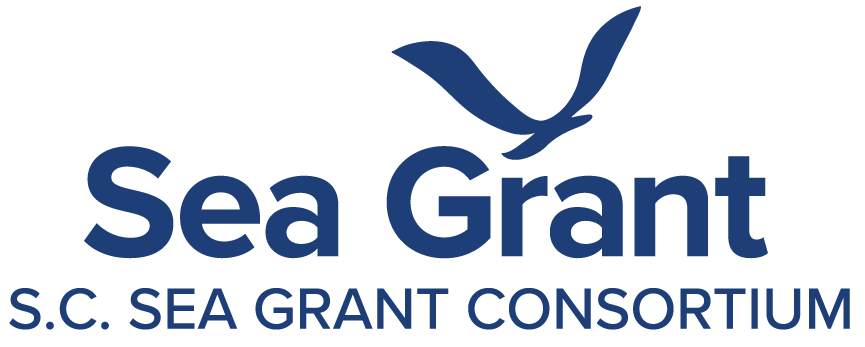A grant awarded to the S.C. Sea Grant Consortium (Consortium) on behalf of the Charleston Resilience Network (CRN) will help community leaders plan for and adapt to the area’s increasing flood challenges.
The $510,319 Regional Coastal Resilience Grant from the National Oceanic and Atmospheric Administration (NOAA) to the Consortium “will support the development of more robust and localized flooding models that can be used to plan infrastructure improvements in the Charleston, S.C. region,” according to Rick DeVoe, executive director of the Consortium and program manager of the award. Researchers from College of Charleston, University of South Carolina and The Citadel will partner with the CRN and the Consortium on the three-year project. The non-federal match of $255,569 brings the total grant award to $765,887.
The mapping will focus down to the individual parcel level to examine the ability of the fast-growing, low-lying community to absorb flood impacts and build resiliency to flooding. This is important as people flock to the area as the Charleston economy builds on its expanding tourism, research, technology and manufacturing sectors.
The flood maps will factor in new data on storm drains and sewer lines, the impacts of severe high tides and heavy bursts of rain and on how the topography influences the movement of water, according to Norman Levine, Ph.D., who will lead the mapping effort. “That type of mapping doesn’t exist at all now,” said Levine, an associate professor in the Department of Geology and Environmental Geosciences at the College of Charleston and director of the Lowcountry Hazards Center. “The new mapping will be better by incorporating multiple models at multiple scales and accuracies, enhancing our understanding of flooding in the region.”
By leveraging the capabilities of CRN members and partners, this project will advance the collaborative approach necessary to understand vulnerabilities, educate stakeholders and foster a unified strategy. The goal will be more effective infrastructure and land use planning, as well as water management practices that minimize risks from chronic and episodic flooding events.
NOAA’s Regional Coastal Resilience Grants focus on regional-scale projects that enhance the resilience of coastal communities and economies. “We are all connected by the watershed we live in,” said Jeff Payne, director of NOAA’s Office for Coastal Management. “What happens in one community affects those downstream. It can be widespread on regional local infrastructure, economies and ecosystems. A piecemeal approach will not be effective. Only by working together can we solve these complex problems.”
“The maps will give us more accurate data to predict how vulnerable we are and what the consequences could be,” said Mark Wilbert, emergency management director for the City of Charleston. “That enables us going forward to come up with better mitigation procedures based on better science.”
The Charleston Resilience Network is a regional public/private partnership formed in 2014 to support and improve resilience efforts in the region. Partners include the Consortium, City of Charleston, Charleston County, Charleston Water System, S.C. Department of Health and Environmental Control’s Office of Ocean and Coastal Resource Management (DHEC-OCRM), SCANA Corp. and Berkeley-Charleston-Dorchester Council of Governments. The U.S. Department of Homeland Security’s Office of Infrastructure Protection and the National Oceanic and Atmospheric Administration will provide advice.
Dan Burger, DHEC-OCRM Coastal Services division director, said the project “is an important step in the region’s effort to develop a common, localized understanding of its vulnerability to tidal and storm-related flooding.”
The resiliency grant’s lead investigators are Levine and Elizabeth Fly, Ph.D., coastal climate extension specialist with the Consortium. Levine will work with associates at College of Charleston, The Citadel, University of South Carolina, NOAA National Weather Service and NOAA Office for Coastal Management to create the detailed flood models.
The second phase of the project will focus on getting this information in the right hands and making sure it is understandable and easy to use for decision-makers throughout the Charleston region. Mayors, town administrators, business leaders and environmental advocates from the area signed a letter of support for the project.
The keys to this effort will be a series of CRN participatory workshops with stakeholders, to be led by Fly, and the expansion of the S.C. Coastal Information Network’s existing web portal. The web portal was created by the Consortium and local, state and federal partners to provide a one-stop location to find coastal-related information of interest to local communities. The website will be updated to enhance simple navigation through the extensive library of flooding and resiliency information, tools and resources, which are available at South Carolina Coastal Information Network .
“This grant provides us the opportunity to expand the efforts of the CRN in a constructive and targeted manner,” Fly said. “Bringing together diverse groups of stakeholders to discuss flood and resilience issues based on the best available science and modeling will allow us to develop both a common language and common understanding of what our region may face in coming years, and how we can all work together to increase our resilience.”
